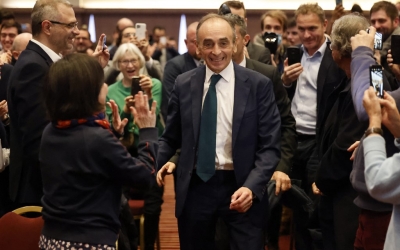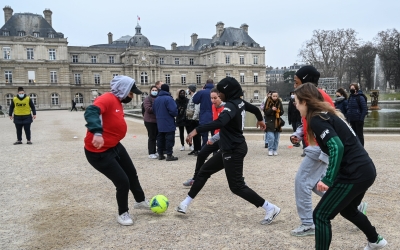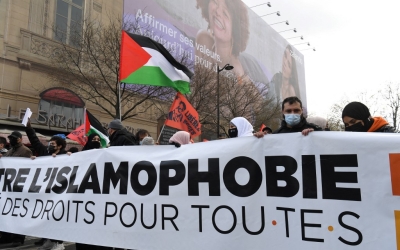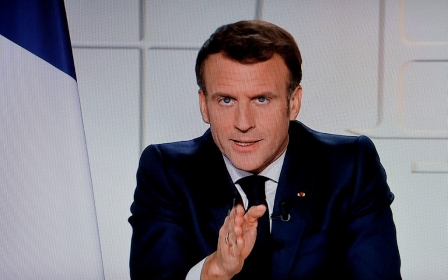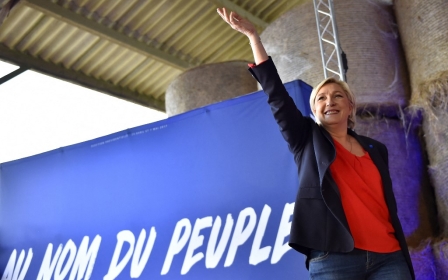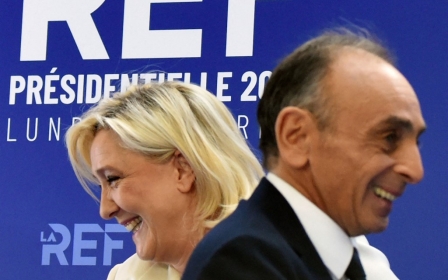France: Muslims fear for safety as far-right normalises racist speech and violence
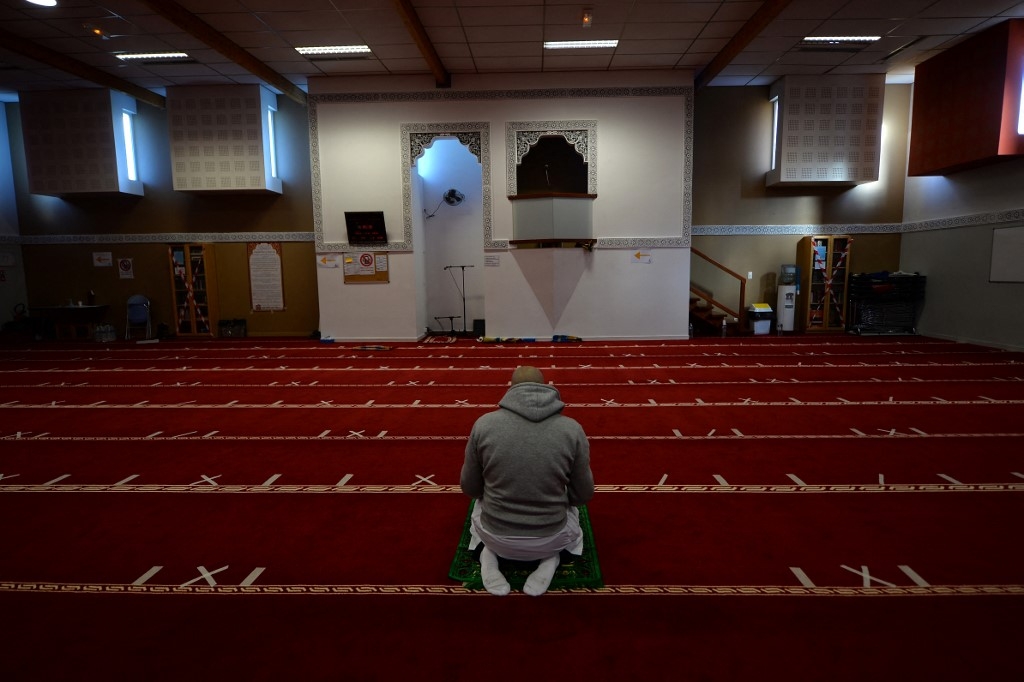
Six years after moving to Toulouse in southern France, Djamel Sekkak no longer feels safe there.
His Islamic funeral services business recently made headlines when it was targeted by a particularly repugnant anti-Muslim act: a dead boar was hung on a pole outside his shopfront in the district of Zenith.
Sekkak was stunned by this "provocation and insult" and now fears for the safety of his sons who help him run the family funeral business, Al-Isra Oua al-Miaraj.
'It used to be that we lived side-by-side without problem. But things have changed... I fear for the future'
- Djamel Sekkak, Muslim business owner
"I'm nearing retirement, but they have to carry on working in this climate, with a total absence of security," he told Middle East Eye in a telephone interview.
This was not the first time Sekkak's business had been vandalised. About two years ago, an attack left his shop windows smashed and walls tagged. He reported the incident to the local authorities, and after a few weeks the case was closed. Those responsible were never identified or brought to trial.
New MEE newsletter: Jerusalem Dispatch
Sign up to get the latest insights and analysis on Israel-Palestine, alongside Turkey Unpacked and other MEE newsletters
Sekkak has noticed "a slow build-up" in anti-Muslim feeling in France since arriving from Algeria in the 1980s.
"It used to be that we lived side by side without problem. But things have changed. I don't get involved in politics, but when I hear [far-right pundit and presidential election candidate Eric] Zemmour say that France is 'on the verge of a civil war,' I fear for the future," said the business owner.
The event compelled the prefect of the Haute-Garonne region to write to the victim denouncing the episode as "despicable".
"Attacks on religion are attacks on our republic. You can be assured of my commitment to fight against all cases of discrimination and intolerance," wrote Etienne Guyot.
'Increasing tolerance' of racism
The boar incident took place on 31 January, just a day after an arson attack on a halal butcher shop in nearby Agen, about 100km from Toulouse, where three swastikas painted on the shopfront bore witness to the ideological affiliation of the perpetrators.
Just like in Sekkak's case, a police inquiry was carried out after the arson attack and came to nothing.
With the April presidential election looming, politicians were swift to condemn the acts and show support for the victims.
Matile Panot, president of the left-wing La France Insoumise political party, said on Twitter: "Anti-Muslim sentiment, time and time again, from the same politicians, the same media outlets."
"Another Islamophobic, disgusting act," echoed Philippe Poutou, presidential candidate for the far-left New Anticapitalist Party (NPA). He blamed Islamophobia within the government and media pundits for encouraging "far-right groups to attack Muslims".
Poutou singled out fellow election candidate Zemmour, a 63-year-old descendent of Algerian Berber Jewish immigrants who made his name as a polemicist on right-wing talk shows.
He has been compared to Jean-Marie Le Pen, the father of his far-right rival Marine Le Pen, who has tried to somewhat distance herself from her father's extreme views.
Le Pen senior and Zemmour both have falsely claimed that Vichy France protected French Jews, for example.
Courts have condemned both several times for racism.
Freedom of 'racist' speech
The "increasing tolerance of racist language spouted by Zemmour and company" has contributed to the current climate, said Dominique Sopo, secretary-general of SOS Racism, an anti-racism movement.
In 2021, a 23-year-old gardener was arrested by police after vandalising several mosques in Doubs. In the suspect's home, police found guns and a copy of Mein Kampf - the autobiographical manifesto by Adolf Hitler.
It later emerged that he also ran an ultra-right digital channel on the Telegram chat app called "Jusqu'en enfer," or "To Hell," on which he encouraged his readers to take violent actions to "hasten a racial war which they consider inevitable".
The racist act was praised by the far-right National Rally party, as one of its members told the investigating judge at the suspect's hearing that "the Muslim religion is not compatible with French values" and that "mosques have no place in France".
At the same time, members of another network, Recolonisation France, were arrested by officers of the French Central Office for Combatting Crimes against Humanity, Genocide and War Crimes (OCLCH) for "organising and participating in a combat group".
The prosecutor in Marseille overseeing the matter said the group was made up of 110 members, including soldiers and former soldiers located throughout France, "gathering and discussing an ideology driven by identity, racism and violence".
These channels, ever-present on the internet, promote an "accelerationist" ideology, according to historian and researcher at the Centre for Political and Social Sciences (CEPEL) Nicolas Lebourg, as quoted by France Info.
They follow the trend of American white supremacists in deploying violence to precipitate a race war that they feel is inevitable in order to establish a white ethnic state.
In Lyon, where small far-right militant groups are particularly active, anti-Muslim hate crimes have multiplied in recent years, including arson attacks on two mosques in 2020, and racist "Muslims out" tags on the wall of a university residence in 2021.
The true scale of Islamphobia
A parliamentary commission on anti-religious incidents, created in December 2021 by Prime Minister Jean Castex and made up of two members of the governing party, set out to investigate the full extent of the situation.
At a meeting with the rector of the Great Mosque of Lyon, commission members were told that his congregation could not comprehend why there had been a lack of responses from Muslim leaders in regard to attacks committed against Muslims.
Abdellah Zekri, head of the National Observatory Against Islamophobia (ONCI) and president of the French Council of the Muslim Faith (CFCM), admitted that heads of places of worship tend to refrain from instigating legal proceedings "believing, rightly or wrongly, that their complaint won't go anywhere".
"In 2021, I personally received 75 letters containing insults and threats to my home address and the headquarters of the CFCM. But I did not file a complaint because I know that there's no point. Most of the time, the perpetrators are not arrested and, when they are, we are told they are not of sound mind," he told MEE.
According to the ministers of the interior and religious affairs, anti-Muslim incidents increased by 38 percent in 2021, while those targeting Jews and Christians have remained the same.
But the true number of Islamophobic incidents in France is much higher, Zekri said.
"This figure only covers incidents reported to the police. It corresponds to crimes, murder attempts, threats, the desecration of places of worship and tombs... but it excludes other violent incidents, such as the cyberhate that sweeps across social media and the discrimination to which some Muslims are subjected, including by the public services."
For Nadia, this feels all too familiar. The Paris resident vividly recalls an incident in 2019, when a politician from the National Rally publicly humiliated a woman wearing a veil who was attending a meeting of the regional council of Bourgogne-Franche-Comté with a group of school children.
'Things are deteriorating, not because French society as a whole has become more racist, but because the political class has failed to treat the children of post-colonial immigration as fully fledged citizens'
- Ahmed Boubeker, sociologist
Nadia, who wears the Islamic headscarf, is constantly in fear of eliciting negative reaction due to her attire.
"Recently, I asked for directions from an elderly lady, who offered no help other than to tell me that people like me had no place in France," she told MEE.
"With the elections coming, many people are growing bolder in expressing their rejection of Muslims. On social media, it's open season," she said.
According to Ahmed Boubeker, a sociologist and professor at the University of Saint-Étienne, a certain right-wing "French intellectual elite" have won the hearts and minds by propagating Islamophobia and "immigration phobia".
He warned about "the public legitimisation of racism" and estimated that Islamophobia has given these right-leaning and far-right elites a new opportunity to ostracise the children of immigrants born in France and "cast them as foreigners".
"These days things are deteriorating, not because French society as a whole has become more racist, but because the political class has failed to treat the children of post-colonial immigration as full-fledged citizens. They are perceived as foreigners in their own country, and therefore a potential threat," he said.
He also condemned the constant hammering of a narrative designed to instil fear and the rejection of anything "foreign," most specifically French people of the Muslim faith.
This article is available in French on Middle East Eye French edition.
Middle East Eye delivers independent and unrivalled coverage and analysis of the Middle East, North Africa and beyond. To learn more about republishing this content and the associated fees, please fill out this form. More about MEE can be found here.


